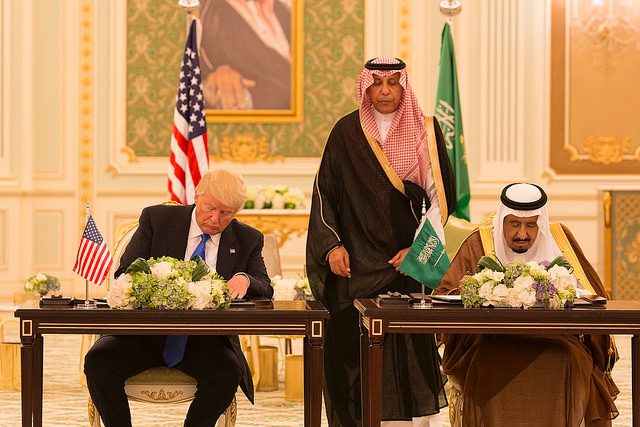Trump, MBS, and the Noxious Saudi Relationship

Aaron David Miller and Richard Sokolsky also judge Mohammed bin Salman’s record to be very poor:
But one thing is already stunningly clear when it comes to his handling of foreign policy: In two short years, as the deputy crown prince and defense minister, MBS has driven the Kingdom into a series of royal blunders in Yemen, Qatar and Iran, and he has likely over promised what Saudi Arabia is able and willing to do on the Israeli-Palestinian peacemaking front. Far from demonstrating judgment and experience, he’s proven to be reckless and impulsive, with little sense of how to link tactics and strategy. And sadly, he’s managed to implicate and drag the new Trump administration into some of these misadventures, too.
Miller and Sokolsky are right about MBS’ shoddy record, but their warning to the Trump administration is very likely too late. They urge the administration to rethink its position before “its Middle East policy becomes a wholly owned subsidiary of Saudi Arabia,” but I fear that that already happened at the Riyadh summit. Unfortunately, some top U.S. officials are only just now realizing it and don’t know how to stop it. There could be some belated efforts to undo this, but Trump isn’t interested. He doesn’t seem to see anything wrong with identifying the U.S. so closely with the Saudis, and he doesn’t see their recklessness and destructive behavior for what they are. Since he is impulsive, careless, and has poor judgment, it isn’t surprising that he has such an affinity for the aging Saudi despot and his favorite incompetent son. On top of all that, MBS is a short-sighted, foolish hard-liner on Iran, and as far as we can tell Trump is much the same, so we should expect them to be on the same page.
There’s no question that every foreign policy initiative associated with MBS has “turned into a hot mess,” but this has been obvious in Yemen for the last two years. If no one in the Trump administration noticed that before, what is going to make them realize it now? The authors are also right that Trump’s decision “to side with Saudi Arabia in its conflict with Qatar and in Yemen is akin to pouring gasoline on a fire,” but until very recently uncritical backing of the Saudis in their regional adventurism enjoyed broad bipartisan support that helped make it possible for things to get this bad. There were very few in Washington who thought that pouring gasoline on the fire was the wrong thing to do, and for more than two years the U.S. poured a lot of gas on the fire in Yemen that has been consuming thousands of lives and putting millions at risk of starvation.
My point here is that Trump has pressed ahead with uncritical support for the Saudis because that has been the conventional hawkish position in Washington for years before he got there. He is catering to the existing warped desire to provide even more support to Riyadh than Obama did. It was conventional wisdom among many foreign policy pundits and analysts that Obama had not been “pro-Saudi” enough, and Trump apparently bought into that view. Trump’s enthusiastic embrace of the Saudis is the result of endlessly berating Obama for not giving the Saudis absolutely everything they wanted.
There is now more open opposition to at least some aspects of U.S. policy in Yemen, as we saw with the recent close vote on a Saudi arms sale. The Qatar crisis has prompted more criticism of the Saudis from our government than two years of destroying and starving an entire country. Yet there is still remarkably little scrutiny of the underlying U.S.-Saudi relationship despite growing evidence that the kingdom has become a regional menace and a major liability to the U.S. Until that changes and until Trump’s excessive fondness for the Saudi leadership starts to become a major political problem for him, pleading with the arsonist’s enabler to put out fires will have little effect.